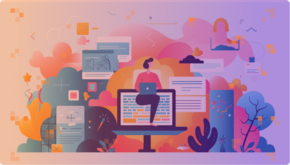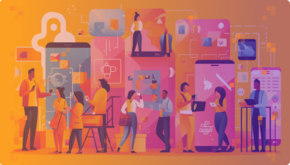
Simon Coulthard April 18, 2022

With its ability to collect data and analyze huge amounts of data, and capacity to predict future trends, and automate time-consuming work, artificial intelligence is transforming marketing strategies. Find out how here.
Data has long been the fuel that powers digital marketing, with success dictated by a company’s ability to fully exploit this resource within the restrictions set by data privacy regulations.
This is where AI comes and how AI is Changing the Future of Digital Marketing
As the amount of data available to marketers has exploded, so too has the need to find better ways of using this information.
This explains why the adoption of AI has increased so dramatically in recent years - from 29% of marketers in 2018 to 84% just two years later (Salesforce).
Given this, you’ve no doubt heard of AI but are unsure about its worth and how it is used - both now and in the future.
Fear not, help is on its way!
What is Artificial Intelligence?
Artificial Intelligence - or AI for short - is a broad field of computer science that designs machines to perform tasks that typically require human intelligence.
Put simply, it enables software to think, read, and react in a human-like way when given a large enough amount of data to work with. It also enables machines to learn from experience and adjust behavior to the realities of new data without human intervention.
In recent years, AI has become an essential tool across a range of industries that includes healthcare, finance, and, our friend, marketing.
It’s all around us, powering everything from Siri and face identification to self-driving cars, smart assistants, and chatbots. But despite the many obvious examples, far more AI apps and tools are actually running quietly behind the scenes - making life easier for everyone.
Ultimately, it all comes down to money.
Artificial intelligence is popular because of the amount of money it saves companies, and for the way it drives revenue. Netflix, for instance, estimates that it has saved over $1 billion by powering its recommendations engine with machine learning.
It’s also big business by itself. In 2025, the global AI market is expected to be worth $190.6 billion - more than eight times what it was worth back in 2018 (MarketsandMarkets).
What are the Benefits of AI Marketing?
In the past, marketers were understandably hesitant about integrating artificial intelligence into their systems and processes.
This has changed dramatically over the last five years, with today’s marketers better understanding the value that AI beings to their work:
- Higher marketing ROI: AI learns from data sources, like leads, conversions, and website interaction, to improve the full sales cycle while automating a lot of work - driving down the costs of your digital marketing strategy
- Better customer experience: AI enables marketers to streamline the consumer journey, with more targeted and personalized communication that is delivered at the ideal moments - enhancing the reputation of their brand in the process
- Improved efficiency: AI enables companies to automate time-intensive work, like emails and social media posts, increasing speed and accuracy while freeing up employees to focus on tasks that would most benefit from a human touch
- More data utility: AI improves your ability to quickly and accurately analyze the huge amounts of data you have at your disposal, enabling you to integrate consumer behavior and trends into your marketing strategy
- Enhanced consumer intelligence: AI enables you to make predictions about customer behavior from historical data, improving everything from stock levels to customer recommendations and product pricing
- Increased personalization: AI’s capacity to instantaneously leverage huge amounts of data enables the hyper-personalization of your marketing strategy, integrating past behavior and future predictions into content delivery
- Better content: AI analyzes the fast pool of segmentation and historical data to determine the content that individual customers will best respond to, as well as the most effective way to deliver it.
Examples of Artificial Intelligence in Marketing
AI can make every aspect of a marketer’s job easier, and solutions can be found for customer support, SEO, data privacy, and so forth.
You can read about some of the more striking examples of AI marketing below:
Chatbots
These are a common sight across the internet, and most of them are AI-powered, without any human involvement. They are a useful way to collect the personal information of internet users, and sustain a continuous pipeline of new leads without the need for human involvement.
Email Marketing
Artificial intelligence automates many of the tasks that would normally be done by an email marketer. It can now assess previous campaigns and use that data to automatically create effective subject lines, for instance, as well as writing content and suggesting appropriate images.
Customer Relationship Management
Artificial intelligence enables companies to fully understand how customers interact across every marketing channel. AI-powered CRMs also enable companies to reduce “churn”, predict sales, and manage personal data - keeping it organized and up-to-date, and helping companies to meet data protection obligations.
Website
AI-enabled software enables companies to analyze the performance of their website in detail, thanks to the analysis of website visitors, bounce rates, heatmaps, and so forth - information that can be used to improve the website’s performance and, with it, the user experience.
The Future of Marketing is Already Here
As the amount of online data continues to grow exponentially, so too will the importance of AI - due to its ability to analyze huge volumes of data quickly and to make informed decisions accurately.
It will be a long time yet before machines work as effectively as humans across every marketing job. But innovation will close the divide in the near future, and it will only become more effective at improving digital marketing strategies and providing companies with data-driven insights about consumer trends and behavior.
As such, AI will continue to be a vital tool for digital marketers, both now and in the future. From this perspective, the future is very much already here.
Share article
Get Started for Free
Gain World-Class Insights & Offer Innovative Privacy & Security

You might also like
Insights to Your Inbox
Receive a monthly summary of website intelligence news, advice, and also product updates. And don't worry, we won't tell sales!










